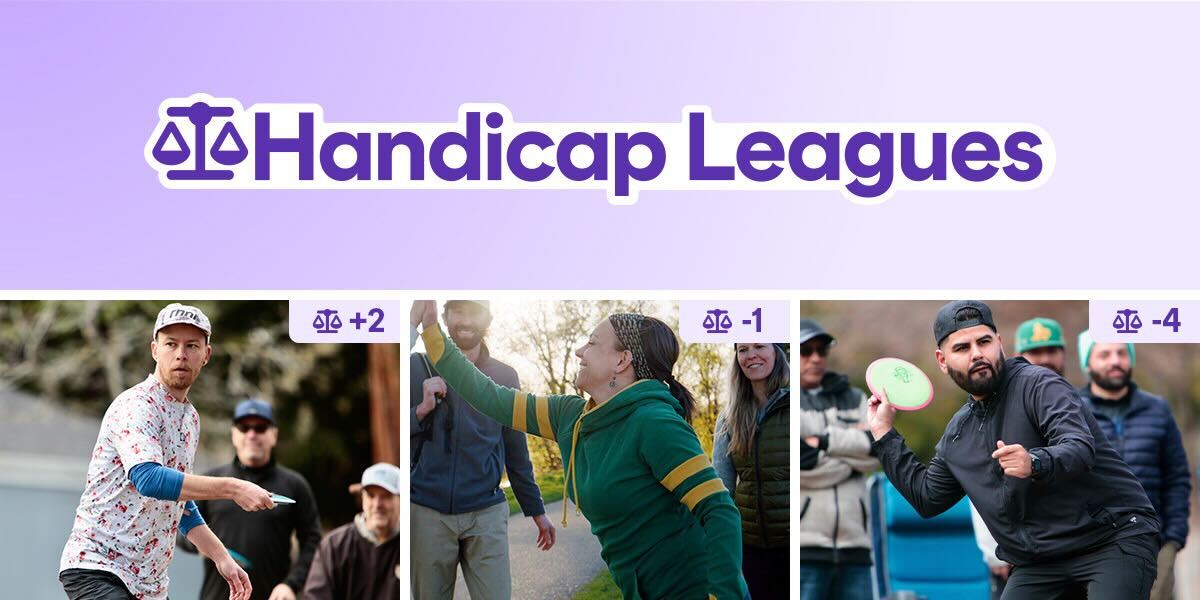Any disc golfer who regularly plays leagues and tournaments – especially in areas with smaller communities – has probably noticed a few common problems:
- A division with so few players that there's no real competition
- Someone who'd like to compete but doesn't because they don't want to A) play in a single-person division or B) play in a division with others nowhere near their skill level
- Having just a few people who always win
Some disc golf event organizers use a great solution to solve these issues: handicap disc golf leagues, which let all players regardless of age, gender, or current skill level compete together on an even playing field. But the extra work involved in running a handicap league – keeping track of every participant's handicap, calculating handicaps into round scores immediately following events, and more – made handicap leagues harder than most to run.
Now, that's changed thanks to the arrival of a tool that does all the work while you have all the fun: UDisc Handicaps, a completely free scoring option for UDisc Leagues (free for organizers and players) that automatically calculates and updates player handicaps, generates real-time leaderboards (handicap scores included!), allows for pre-registration, keeps up with league standings over an entire season, and more.
Get the full picture of this platform by reading the whole post or jump to the topic that interests you most by clicking/tapping on it in the navigation below:
Post Navigation: UDisc Handicap Disc Golf Leagues
- What is a handicap in disc golf?
- What's the point of using disc golf handicaps?
- How do you calculate disc golf handicaps (and are they really fair for everyone)?
- How do I start/convert to a UDisc Handicap League as an event organizer?
- What do competitors need to play in a UDisc Handicap League?
- UDisc Leagues are really, truly completely free for everyone: Here's why
What Is a Handicap in Disc Golf?
In disc golf, "handicap" is interchangeable with "starting score." In most cases, they are meant to make your score at or around par if you have an average round. For example, if your historical performance suggests that you'll score +4 on a course layout during an average round, your handicap (i.e., starting score) would be -4.
Why? It's because -4 (Handicap) + 4 (Your Average) = 0 (Par).
But say you shoot hot and get a -1 "real" score, here's what your score would be:
-
-4 (Handicap) + -1 (Actual Score) = -5 (Handicap Score)
And on a bad day, something like this could happen:
-
-4 (Handicap) + 10 (Actual Score) = +6 (Handicap Score)
Since disc golf is a sport where birdies are far more common than traditional golf, handicaps can also be well into the plus side. For example, a skilled player expected to score -6 on an 18-hole course with an average performance could have a handicap of +6.
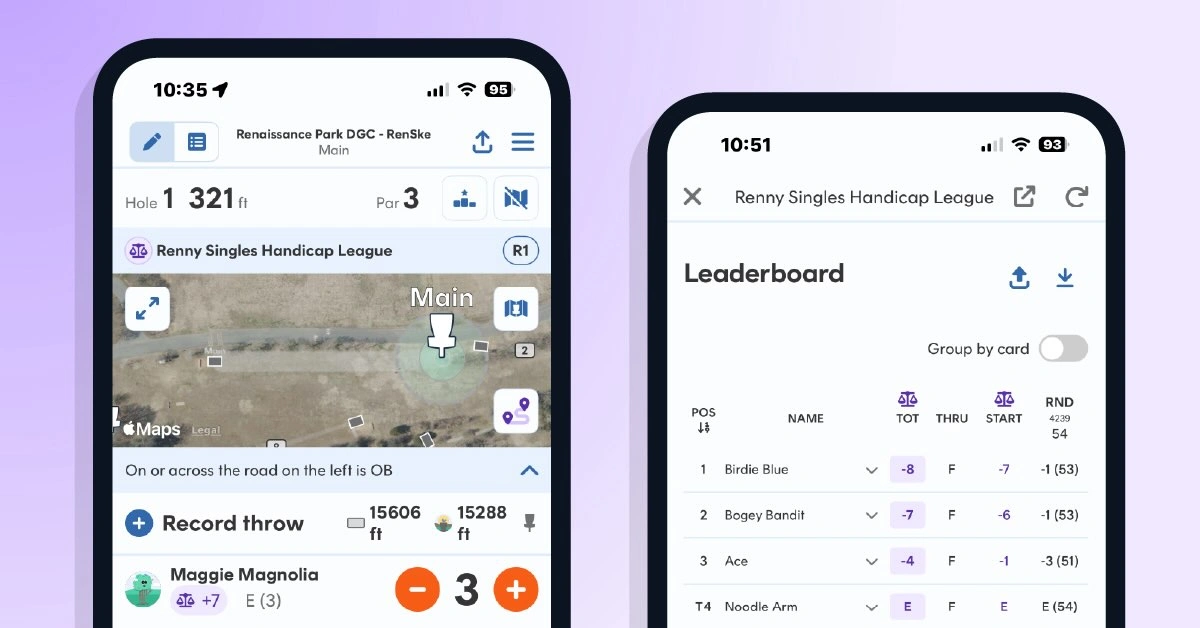
We do want to note that though we're talking in terms of averages here for simplicity's sake, UDisc Handicaps are not just raw averages of players' scores relative to par. Our calculations take things like field size, the huge potential for scoring variation among newer players, not overly penalizing skilled players, and more into consideration.
Two other important things about handicaps are:
- Handicaps are not static. If you start playing a lot better, your handicap will change to reflect that.
- Your handicap changes not just course-to-course but layout-to-layout. If a course has both a beginner and championship layout, you'd have a different handicap depending on which layout you were playing.
What's the Point of Disc Golf Handicaps?
Handicaps are normally used in disc golf leagues or other competitive settings. They create the opportunity for players of different skill levels, ages, etc. to compete with one another on an even playing field, often attracting a more diverse set of competitors than traditional disc golf competitions.
Handicap league organizer Mike Batka, for one, can attest to that.
"While the league was primarily men ages 20-49, we also had teenagers as well as people in their 50s, 60s, and 70s," Batka said. "There were also weeks when 10+ women competed. A handicapped format is a great way to introduce recreational disc golfers to competitive play."
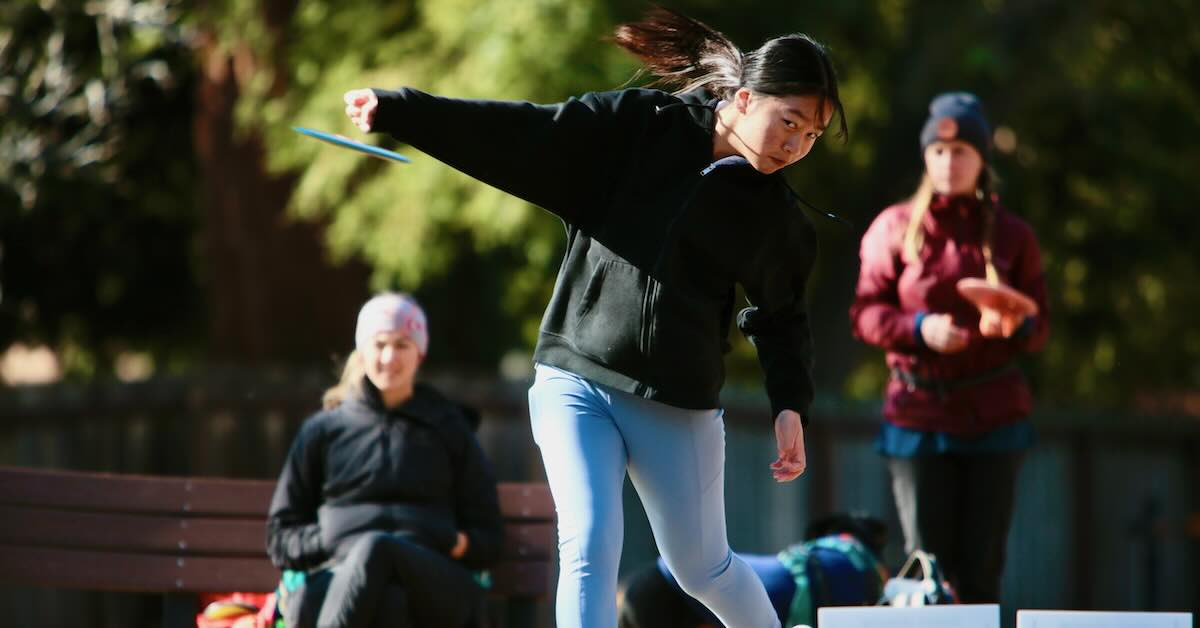
Erika Apple in upstate New York, a person dedicated to providing spaces where women feel comfortable playing disc golf, has also seen positive effects from handicaps.
"We get a lot of women joining our handicap league [because] a handicap league makes it more enjoyable," Apple asserted.
Players who typically score well above par can feel motivated by having a chance to win or place well at an event. Players who typically score at or below par can feel challenged to push themselves to new levels.
"We didn't see the same names at the top every week," said Batka. "The top spot might be one of the best area disc golfers one week and someone who has only been playing a year or two the next week."
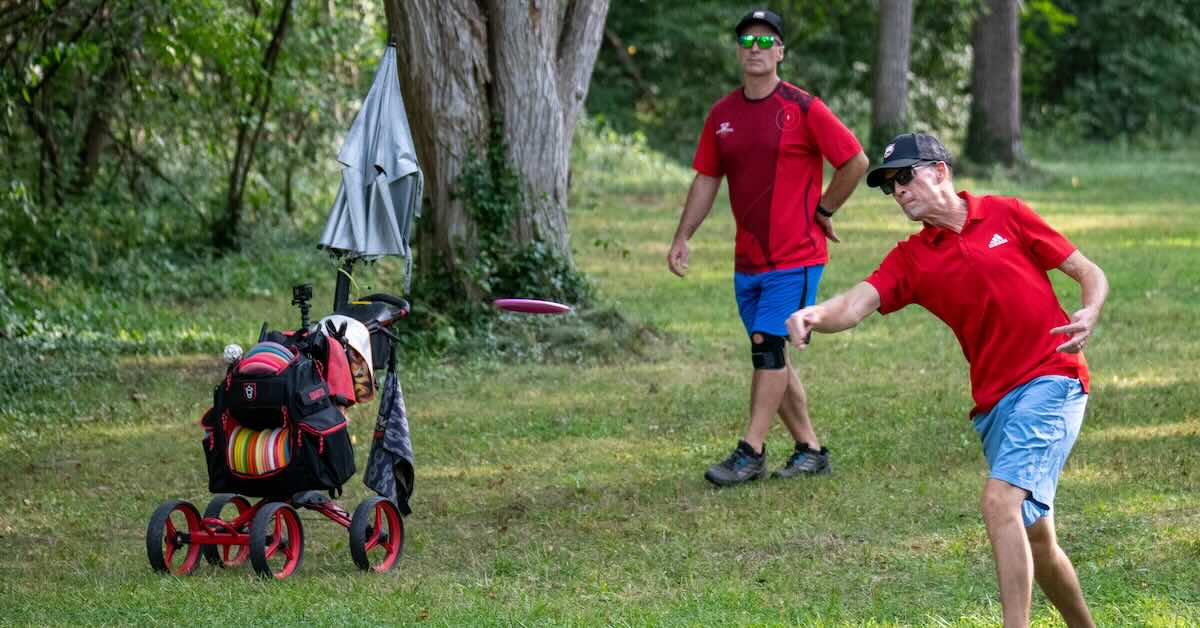
Handicap leagues are especially great for small disc golf communities where creating separate divisions would result in lone automatic winners or just two or three players competing against each other. Instead, all competitors can play together, enjoy the camaraderie, and have a roughly equal chance of a good result.
"We wanted to create a league that was cheap, flexible, and competitive to everyone while having no divisions," another handicap league organizer, Ryan Beattie, said, explaining why his club of 15 people opted to create a handicap league. "We want everyone to play with, meet, and become friends with everyone else in the club."
But handicap disc golf leagues are also popular in larger communities because they offer the chance for people to mingle across divisions in a competitive setting, learning new tips and tricks or simply getting to know new people in the scene.
"Our league regularly drew well over 100 people per week," Batka said. "To come out on top, you had to be at your best – whether that was a 45 or 65."
How Do You Calculate Disc Golf Handicaps?
UDisc Disc Golf League Handicaps operate on the same system that produces our Round Ratings and Layout Difficulties.
Here are the main ingredients in your UDisc Disc Golf League Handicap:
- Past scores at a specific Handicap Disc Golf League (i.e., not your general Competition Rating, everyday scores, or even scores at other UDisc Leagues).
- The distance of a layout's holes and its difficulty
- Estimated field size (i.e., the number of people likely playing the league that day)
We realize that explanation probably doesn't cover all of your questions, so here are some Q&A's that might help clear things up even more:
- How do I get a Disc Golf Handicap for a Handicap Disc Golf League I've never played?
You need to play one of a league's events to establish a handicap. After that, you'll always have a handicap for that league. - How many of my rounds count in my Disc Golf Handicap, and how do you choose which ones?
Since handicaps are meant to reflect your current abilities, it's simply your five most recent rounds at a league that count toward your handicap – not a selection of best or worst. Five rounds is the max number, but you only need to play one league event to establish a handicap. - Not to brag, but I'm really, ridiculously good at disc golf. Will I really have a chance to place well at a Handicap Disc Golf League?
Yes! Our Disc Golf League Handicaps are carefully calculated to provide players of all skill levels an equal chance to place well on the leaderboard. If you check out the previous section, you'll see that an organizer of a handicap league that often attracts over 100 players said, "The top spot might be one of the best area disc golfers one week and someone who has only been playing a year or two the next week." Great disc golfers certainly have a chance to win handicap leagues – you'll just have stiffer competition than you're probably used to at most local events pushing you to play your best.
How Do I Create a Handicap Disc Golf League with UDisc?
UDisc Handicap Disc Golf Leagues are easy to start and absolutely free for organizers and players. You've accomplished the hardest and most important part when you've convinced at least a few players to join one.
When you create a handicap disc golf league (or any league) on UDisc, you have access to a variety of tools that allow you to stay focused on just enjoying the game. The following steps will guide you through where to start:
- Make sure the layout(s) you want to play are Smart Layouts.
UDisc Handicaps only work on Smart Layouts at courses. If a layout you intend to use in your league is currently a Classic Layout (or is not available in UDisc at all), you will need to make a Smart Layout before starting league play. More information about Smart Layouts can be found here. - Head to udisc.com/leagues/apply to create your league.
You'll be asked to name your league, select the home course your league typically plays at, the play format (currently, only singles leagues can use handicaps), and a short description to let players know what to expect. You'll then have access to League tools where you can add details and start creating your event(s)! - Create an event that uses handicap scoring.
In your League tools, tap on the Settings tab, turn on Handicap scoring, and scroll down to save. Remember that all league members will need to play one round of the league to establish a handicap.
Once you've activated handicap scoring, all you need to do is advertise your event! - Use your event QR code to advertise to local players!
Now that your event is created, it will display in the Events tab in UDisc for players as well as the Events page on UDisc's website. On the day of your event, a banner will also display on the course detail page to notify players that an event is taking place. If you're sharing your event on a club social media page, don't forget to download your event Quick Link! This can be found at the top of your event page in your admin tools.
What Do I Need to Play in a UDisc Handicap Disc Golf League?
To play in a UDisc Handicap Disc Golf League all you need is a UDisc account. UDisc accounts are completely free and can be used as often and for as long as you like.
UDisc Disc Golf Leagues Are Free for Everyone: Here's Why
All UDisc Leagues and Events are free for everyone: Players, organizers, and fans interested in following the results.
Why is it free?
It's because UDisc's mission is to empower the world to play more disc golf – a low-impact, physically and mentally healthy pastime that brings people of all sorts together to build communities. Making it easy and free for players anywhere to regularly meet up for friendly competition supports that mission. Striving to make UDisc Leagues and Events offer the best and most seamless experience possible does, too: The better the experience, the more people will want to repeat it (and tell their friends).
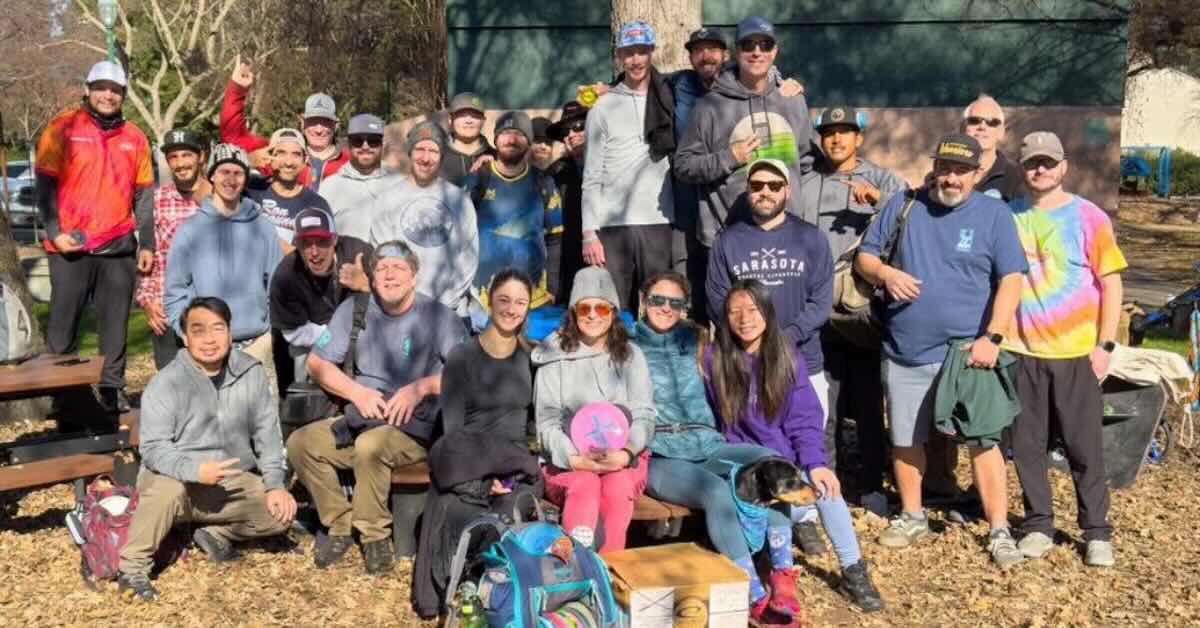
Additionally, UDisc Leagues and Events help show the impact of disc golf in your area. UDisc offers statistics on rounds played, hours spent on the course, overall participation, and more to Course Ambassadors and others interested in growing the sport (again, completely free) to make the case for new courses and improvements that benefit everyone.
Yes, there is UDisc Pro which gives disc golfers lots of awesome extras for under $3 a month, but it is absolutely not necessary for participating in or running UDisc Leagues or Events.
More Questions About Handicap Disc Golf Leagues? Ask Us!
If you have other questions about how to create UDisc Handicap Disc Golf League, we're happy to assist! You can reach out to us at [email protected].

